NT
-
 KAIST Celebrates the 2017 Commencement
KAIST hosted its 2017 Commencement, awarding diplomas to 2,767 members of the Class of 2017 during a ceremony on February 17. President Sung-Mo Kang, Minister Yang-hee Choi of Science, ICT, and Future Planning, and Chairman of the KAIST Board of Trustees Jang-Moo Lee joined the ceremony along with the graduates and their family and friends at the Ryu Keun Chul Sports Complex.
The graduating class included 638 Ph.D. degrees, 1,335 Master’s degrees, and 794 Bachelor’s degrees being conferred. Among them, Young-Ki Song from the Department of Electric Engineering was honored to win the Minister’s Award, the highest award bestowed to an undergraduate. The KAIST Presidential Award went to Min-Jae Park of the Department of Mathematical Sciences and the KAIST Board of Trustee Chairman’s Award was presented to Jae-Hyung Cho from the Department of Mechanical Engineering.
Including this year’s graduating class, KAIST has turned out more than 59,000 highly educated science and technology talents including 11,731 Ph.D.s since its foundation in 1971. This year, 24-year-old Seo-Hee Oh earned her Ph.D. in chemistry as the youngest Ph.D. of the year after completing her Master’s and Ph.D. combined course in three years.
President Sung-Mo Kang praised the creativity of this graduating class and their excellent ability in his charge, saying, “As future leaders of our society, you are expected to develop a sense of compassion and outstanding professionalism to contribute to the advancement of not only Korea but also the whole world.’
For full text of President Kang’s charge to the graduates, please click.
2017.02.17 View 9335
KAIST Celebrates the 2017 Commencement
KAIST hosted its 2017 Commencement, awarding diplomas to 2,767 members of the Class of 2017 during a ceremony on February 17. President Sung-Mo Kang, Minister Yang-hee Choi of Science, ICT, and Future Planning, and Chairman of the KAIST Board of Trustees Jang-Moo Lee joined the ceremony along with the graduates and their family and friends at the Ryu Keun Chul Sports Complex.
The graduating class included 638 Ph.D. degrees, 1,335 Master’s degrees, and 794 Bachelor’s degrees being conferred. Among them, Young-Ki Song from the Department of Electric Engineering was honored to win the Minister’s Award, the highest award bestowed to an undergraduate. The KAIST Presidential Award went to Min-Jae Park of the Department of Mathematical Sciences and the KAIST Board of Trustee Chairman’s Award was presented to Jae-Hyung Cho from the Department of Mechanical Engineering.
Including this year’s graduating class, KAIST has turned out more than 59,000 highly educated science and technology talents including 11,731 Ph.D.s since its foundation in 1971. This year, 24-year-old Seo-Hee Oh earned her Ph.D. in chemistry as the youngest Ph.D. of the year after completing her Master’s and Ph.D. combined course in three years.
President Sung-Mo Kang praised the creativity of this graduating class and their excellent ability in his charge, saying, “As future leaders of our society, you are expected to develop a sense of compassion and outstanding professionalism to contribute to the advancement of not only Korea but also the whole world.’
For full text of President Kang’s charge to the graduates, please click.
2017.02.17 View 9335 -
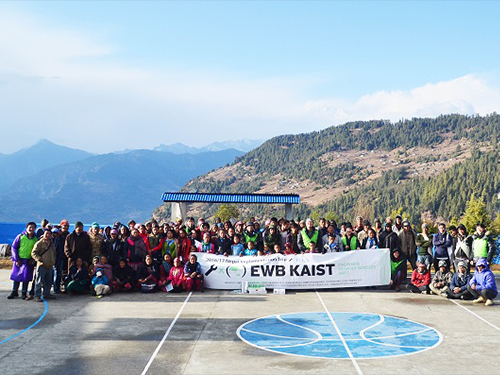 EWB-KAIST Wraps up Five-Year Project in Nepal
‘Engineers Without Borders-KAIST (EWB-KAIST)’ led by Professor Tae-ho Song from the Department of Mechanical Engineering returned to Korea on January 10 after a two-week project in Nangi, Nepal.
EWB-KAIST was established in 2012 by KAIST students and professors. Since then, the team visited Nangi, in the Annapurna region of Nepal, to engage in Appropriate Technology (AT) development projects. The projects included building passive houses and small hydroelectric power, and teaching science education. In particular, passive houses that use straw as an insulator received great a reception from the locals.
This was their last visit to Nepal, since the five-year project has now come to an end. Future projects in Mongolia will be led by Professor Buhm Soon Park from the Graduate School of Science and Technology Policy.
Professor Song commented, “I am glad that the Nepal project was successfully conducted over the last five years. To make sure the support does not end here, I will personally continue to visit the Himalayas to assist the villagers.”
EWB-KAIST is a non-profit organization that conducts activities with the aim of AT development and providing support for less-developed countries in need of the benefits of technology.
( Passive house made of straws by EWB-KAIST team in Nangi, Nepal.)
2017.02.01 View 7622
EWB-KAIST Wraps up Five-Year Project in Nepal
‘Engineers Without Borders-KAIST (EWB-KAIST)’ led by Professor Tae-ho Song from the Department of Mechanical Engineering returned to Korea on January 10 after a two-week project in Nangi, Nepal.
EWB-KAIST was established in 2012 by KAIST students and professors. Since then, the team visited Nangi, in the Annapurna region of Nepal, to engage in Appropriate Technology (AT) development projects. The projects included building passive houses and small hydroelectric power, and teaching science education. In particular, passive houses that use straw as an insulator received great a reception from the locals.
This was their last visit to Nepal, since the five-year project has now come to an end. Future projects in Mongolia will be led by Professor Buhm Soon Park from the Graduate School of Science and Technology Policy.
Professor Song commented, “I am glad that the Nepal project was successfully conducted over the last five years. To make sure the support does not end here, I will personally continue to visit the Himalayas to assist the villagers.”
EWB-KAIST is a non-profit organization that conducts activities with the aim of AT development and providing support for less-developed countries in need of the benefits of technology.
( Passive house made of straws by EWB-KAIST team in Nangi, Nepal.)
2017.02.01 View 7622 -
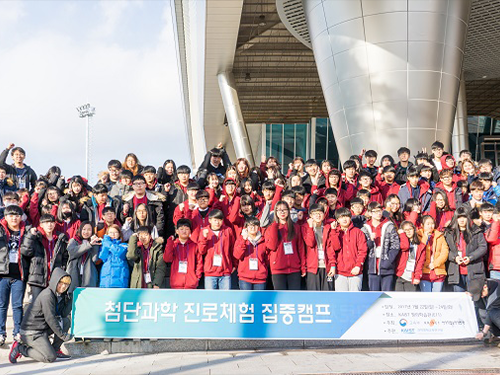 KAIST Intensive Science Camp for Middle-High School Students
The KAIST Global Institute of Talented Education (Director: Dong-Soo Kwon) invited around 90 middle and high school students for an advanced science intensive camp from January 22 to 24.
This camp targeted middle and high school students in community centers or child-care institutions. It aims to increase students’ interest in science and engineering, and assist them with their career paths through programs such as special lectures on science, advanced science projects, and career mentoring.
Participating students were divided into groups of seven or eight with a KAIST student as a mentor to conduct advanced science projects such as VR controller production and robot arm programming. The camp included exploring future career options and science and engineering college admission counselling.
Jiyoung Ryu, Research Professor for the KAIST Global Institute of Talented Education, said, “KAIST started the science and engineering career experience program in 2016 with the Ministry of Education and Korea Research Institute for Vocational Education and Training (KRIVET). So far, 6000 middle and high school students from around the country have participated. The camp is more meaningful since it educates students in social responsibility, in addition to the fields of science and engineering, both of which are missions and goals that KAIST strives for.” She continued to say, “We plan to continue to expand the program in the future.”
The KAIST Global Institute of Talented Education is actively conducting research and projects on national education for talented youth such as policy research concerning gifted education, science and engineering career education, advanced science camps, training for gifted education teachers, and cyber gifted education programs.
2017.02.01 View 8537
KAIST Intensive Science Camp for Middle-High School Students
The KAIST Global Institute of Talented Education (Director: Dong-Soo Kwon) invited around 90 middle and high school students for an advanced science intensive camp from January 22 to 24.
This camp targeted middle and high school students in community centers or child-care institutions. It aims to increase students’ interest in science and engineering, and assist them with their career paths through programs such as special lectures on science, advanced science projects, and career mentoring.
Participating students were divided into groups of seven or eight with a KAIST student as a mentor to conduct advanced science projects such as VR controller production and robot arm programming. The camp included exploring future career options and science and engineering college admission counselling.
Jiyoung Ryu, Research Professor for the KAIST Global Institute of Talented Education, said, “KAIST started the science and engineering career experience program in 2016 with the Ministry of Education and Korea Research Institute for Vocational Education and Training (KRIVET). So far, 6000 middle and high school students from around the country have participated. The camp is more meaningful since it educates students in social responsibility, in addition to the fields of science and engineering, both of which are missions and goals that KAIST strives for.” She continued to say, “We plan to continue to expand the program in the future.”
The KAIST Global Institute of Talented Education is actively conducting research and projects on national education for talented youth such as policy research concerning gifted education, science and engineering career education, advanced science camps, training for gifted education teachers, and cyber gifted education programs.
2017.02.01 View 8537 -
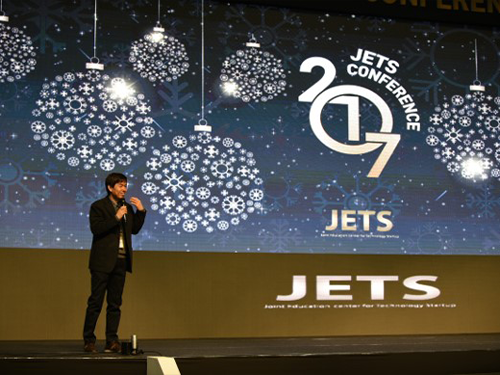 JETS Conference 2017
KAIST and four science and technology research universities in Korea co-hosted a technology start-up fair, the 2017 JETS (Job, Exhibition, Tech Forum, and Startup) Conference January 19 ~20 in the Ryu Geun-chul Sports Complex at KAIST.
Korea’s major science and technology research universities, Daegu Gyeongbuk Institute of Science and Technology (DGIST), Gwangju Institute of Science and Technology (GIST), Pohang University of Science and Technology (Postech), and Ulsan National Institute of Science and Technology (UNIST), held the event in a collaborative effort to educate, inspire, and connect young entrepreneurs, especially those who will launch technology start-ups.
The conference brought entrepreneurs and innovators together who seek ways of working with and supporting start-ups and for their sustainable growth. It also drew aspiring young students and researchers from universities and the government-funded research institutions who are in the process of commercializing their technology. Students from each university’s industry-academia cooperation program who incubated their technology and ideas were key contributors.
At the Tech Forum, entrepreneurship and technology consultation specialists including Joe Jasin, managing director at DNA Investment Partners in the US, the founder of Cyworld Dong-Hyung Lee, and Professor Hawoong Jeong, a complex bio-network specialist from the Department of Physics of KAIST lectured on the ecosystem of start-ups and its trends and development.
The Dean of University-Industry Cooperation at KAIST Joongmyeon Bae said, "We organized this event in collaboration with four major research universities to further encourage technology start-ups from young students and help their ideas and technology bear fruit. We will continue to strive to create an ecosystem of start-ups which works efficiently.”
(Above photo: Founder of the Cyworld, Dong-Hyung Lee gives a lecture at the Tech Forum. Below photo: Students visit exhibition booth of each participating institution.)
2017.01.20 View 12333
JETS Conference 2017
KAIST and four science and technology research universities in Korea co-hosted a technology start-up fair, the 2017 JETS (Job, Exhibition, Tech Forum, and Startup) Conference January 19 ~20 in the Ryu Geun-chul Sports Complex at KAIST.
Korea’s major science and technology research universities, Daegu Gyeongbuk Institute of Science and Technology (DGIST), Gwangju Institute of Science and Technology (GIST), Pohang University of Science and Technology (Postech), and Ulsan National Institute of Science and Technology (UNIST), held the event in a collaborative effort to educate, inspire, and connect young entrepreneurs, especially those who will launch technology start-ups.
The conference brought entrepreneurs and innovators together who seek ways of working with and supporting start-ups and for their sustainable growth. It also drew aspiring young students and researchers from universities and the government-funded research institutions who are in the process of commercializing their technology. Students from each university’s industry-academia cooperation program who incubated their technology and ideas were key contributors.
At the Tech Forum, entrepreneurship and technology consultation specialists including Joe Jasin, managing director at DNA Investment Partners in the US, the founder of Cyworld Dong-Hyung Lee, and Professor Hawoong Jeong, a complex bio-network specialist from the Department of Physics of KAIST lectured on the ecosystem of start-ups and its trends and development.
The Dean of University-Industry Cooperation at KAIST Joongmyeon Bae said, "We organized this event in collaboration with four major research universities to further encourage technology start-ups from young students and help their ideas and technology bear fruit. We will continue to strive to create an ecosystem of start-ups which works efficiently.”
(Above photo: Founder of the Cyworld, Dong-Hyung Lee gives a lecture at the Tech Forum. Below photo: Students visit exhibition booth of each participating institution.)
2017.01.20 View 12333 -
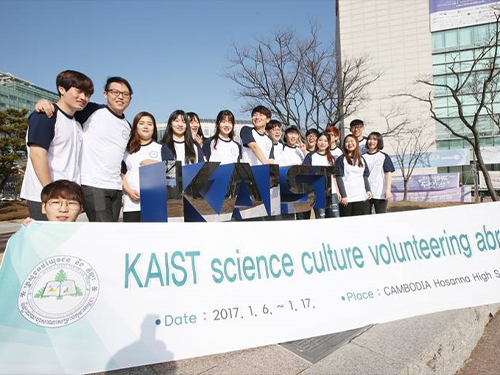 Science, IT & Culture Volunteering Team at Cambodia
The Science, IT and Culture Volunteering Team, which is composed of 17 undergraduates, is visiting Cambodia January 1 to 16. Based at Hosanna High School in Phnom Penh, the KAIST volunteering team will participate in diverse science and IT classes as well as cultural events for Cambodian high school students.
The KAIST volunteering service is designed to improve Cambodian students’ science education including the areas of physics, chemistry, biology, earth science, as well as an increased exposure to IT technologies. For this service, the volunteering team has prepared for three months, making syllabi for the science classes in addition to planning Arduino IT classes and cultural performances, including K-pop dances and Korean traditional games.
The team will present various science experiments including smart electric fan and mini vehicles using Arduino. Before departing, the students made great efforts to ensure this service would be a success by taking a basic Khmer language class and studying safety education.
Se-Woong Oh, the head of the team said, "All our members are very excited to have the chance to share our knowledge with Cambodian students and help them learn science and IT technology. We hope this service will serve as an opportunity to understand a different culture as well. We made every effort to prepare for an activity we believe in."
(KAIST volunteer team with Hosanna High School students in Phnom Penh, Cambodia.)
2017.01.10 View 5059
Science, IT & Culture Volunteering Team at Cambodia
The Science, IT and Culture Volunteering Team, which is composed of 17 undergraduates, is visiting Cambodia January 1 to 16. Based at Hosanna High School in Phnom Penh, the KAIST volunteering team will participate in diverse science and IT classes as well as cultural events for Cambodian high school students.
The KAIST volunteering service is designed to improve Cambodian students’ science education including the areas of physics, chemistry, biology, earth science, as well as an increased exposure to IT technologies. For this service, the volunteering team has prepared for three months, making syllabi for the science classes in addition to planning Arduino IT classes and cultural performances, including K-pop dances and Korean traditional games.
The team will present various science experiments including smart electric fan and mini vehicles using Arduino. Before departing, the students made great efforts to ensure this service would be a success by taking a basic Khmer language class and studying safety education.
Se-Woong Oh, the head of the team said, "All our members are very excited to have the chance to share our knowledge with Cambodian students and help them learn science and IT technology. We hope this service will serve as an opportunity to understand a different culture as well. We made every effort to prepare for an activity we believe in."
(KAIST volunteer team with Hosanna High School students in Phnom Penh, Cambodia.)
2017.01.10 View 5059 -
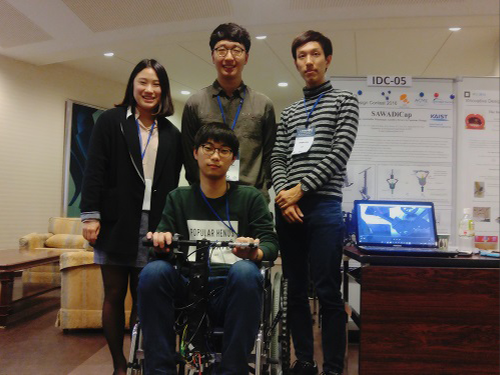 KAIST Undergraduates Win the Innovative Design Contest 2016
A team of KAIST students, consisting of five undergraduates (Do-Hoon Kwon, Tae-Hyun Kim, Hak-Gi Do, Hyun-Joo Lee, and Jong-Ho Jeong) from the Department of Mechanical Engineering, won the grand prize at the Innovative Design Contest held at Osaka University in Japan on December 12-13, 2016. The event took place during the 16th Asia Design Engineering Workshop (A-DEWS).
For this year’s contest, a total of ten student teams from such countries as Korea, Japan, Taiwan, and Malaysia participated, and Team KAIST earned the highest scores. The five KAIST students, all taking the course entitled “Production of Creative Systems,” developed a manual wheelchair accessory called “Safe Attachable Wheelchair Assistive Device in Capstone Design (SAWADiCap).
SAWADiCap is a detachable auxiliary power device that increases the range and mobility of manual wheelchairs. The device can easily be installed and removed, compared to existing add-on attachments for wheelchairs. Users can also enjoy similar advantages offered by powered wheelchairs at a lower cost. In their presentation on the device, the KAIST students introduced their design to improve the power of manual wheelchairs employing the magnetic reinforcement effect and to include the safety features necessary for users to install or operate the device.
Do-Hoon Kwon said, “Our team had a great experience participating in the contest—we met people with diverse backgrounds and expanded our understanding in the field.”
Professor Seibum B. Choi of the Mechanical Engineering Department, who advises the KAIST team, added, “I hope our technology can help the spread of affordable wheelchairs and increase mobility for the disabled.”
Established in 2000, A-DEWS is held annually by the Asian branch of the Design Engineering Workshop to provide an international forum for researchers and practitioners in the field of design engineering by facilitating the exchange of recent research results and sharing knowledge about design strategies and methods. This year’s theme for the workshop was “Innovation of Life.”
A-DEWS hosts the Innovative Design Contest to encourage young engineers, researchers, and students who are creating innovative products, services, and product-services and to show appreciation for their efforts.
Pictured below from left to right are Hyun-Joo Lee, Do-Hoon Kwon, Jong-Ho Jeong, and Hak-Gi Do.
2017.01.03 View 9909
KAIST Undergraduates Win the Innovative Design Contest 2016
A team of KAIST students, consisting of five undergraduates (Do-Hoon Kwon, Tae-Hyun Kim, Hak-Gi Do, Hyun-Joo Lee, and Jong-Ho Jeong) from the Department of Mechanical Engineering, won the grand prize at the Innovative Design Contest held at Osaka University in Japan on December 12-13, 2016. The event took place during the 16th Asia Design Engineering Workshop (A-DEWS).
For this year’s contest, a total of ten student teams from such countries as Korea, Japan, Taiwan, and Malaysia participated, and Team KAIST earned the highest scores. The five KAIST students, all taking the course entitled “Production of Creative Systems,” developed a manual wheelchair accessory called “Safe Attachable Wheelchair Assistive Device in Capstone Design (SAWADiCap).
SAWADiCap is a detachable auxiliary power device that increases the range and mobility of manual wheelchairs. The device can easily be installed and removed, compared to existing add-on attachments for wheelchairs. Users can also enjoy similar advantages offered by powered wheelchairs at a lower cost. In their presentation on the device, the KAIST students introduced their design to improve the power of manual wheelchairs employing the magnetic reinforcement effect and to include the safety features necessary for users to install or operate the device.
Do-Hoon Kwon said, “Our team had a great experience participating in the contest—we met people with diverse backgrounds and expanded our understanding in the field.”
Professor Seibum B. Choi of the Mechanical Engineering Department, who advises the KAIST team, added, “I hope our technology can help the spread of affordable wheelchairs and increase mobility for the disabled.”
Established in 2000, A-DEWS is held annually by the Asian branch of the Design Engineering Workshop to provide an international forum for researchers and practitioners in the field of design engineering by facilitating the exchange of recent research results and sharing knowledge about design strategies and methods. This year’s theme for the workshop was “Innovation of Life.”
A-DEWS hosts the Innovative Design Contest to encourage young engineers, researchers, and students who are creating innovative products, services, and product-services and to show appreciation for their efforts.
Pictured below from left to right are Hyun-Joo Lee, Do-Hoon Kwon, Jong-Ho Jeong, and Hak-Gi Do.
2017.01.03 View 9909 -
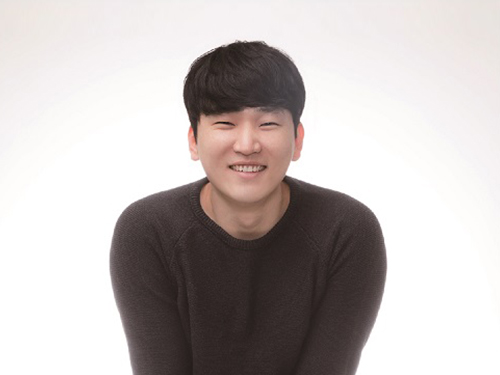 KAIST Ph.D. Candidate Wins the Next Generation of Engineers Award
Joo-Sung Kim, a doctoral student at the EEWS (Environment, Energy, Water and Sustainability) Graduate School won the inaugural Next Generation of Engineers Award in Leadership on December 14, 2016.
The National Academy of Engineering of Korea hosts this award to support creative and ambitious students who have the potential to become leaders in engineering and who will serve as role models for future Korean engineers. Based on the recommendations of university professors in engineering and members of the academy, seven students are selected for the award in the categories of leadership and entrepreneurship.
With his research focus on the development of high-performance, next-generation secondary cells for wearable devices such as smart watches, health bands, and smart eyewear, Joo-Sung created a startup, Lithium-ion Battery Energy Science and Technology (LiBEST), Inc. He plans to base his company at the Office of University and Industry Cooperation, KAIST, where he can receive assistance for launching the mass-production system for his technology.
His adviser, Professor Jang-Wook Choi of the EEWS Graduate School, noted, “Joo-Sung has been a great student who has a strong sense of curiosity and perseverance. The award is the by-product of his hard work.”
“I have always enjoyed my work and study as a researcher, but eventually would like to expand my career into business based on the results of my research. It would be wonderful if I could become a businessman like Elon Musk, Masayoshi Son, or Ma Yun and create a role model for aspiring engineers in Korea by combining science and technology with business demand to create social values that benefit many people,” Joo-Young said.
2016.12.26 View 10868
KAIST Ph.D. Candidate Wins the Next Generation of Engineers Award
Joo-Sung Kim, a doctoral student at the EEWS (Environment, Energy, Water and Sustainability) Graduate School won the inaugural Next Generation of Engineers Award in Leadership on December 14, 2016.
The National Academy of Engineering of Korea hosts this award to support creative and ambitious students who have the potential to become leaders in engineering and who will serve as role models for future Korean engineers. Based on the recommendations of university professors in engineering and members of the academy, seven students are selected for the award in the categories of leadership and entrepreneurship.
With his research focus on the development of high-performance, next-generation secondary cells for wearable devices such as smart watches, health bands, and smart eyewear, Joo-Sung created a startup, Lithium-ion Battery Energy Science and Technology (LiBEST), Inc. He plans to base his company at the Office of University and Industry Cooperation, KAIST, where he can receive assistance for launching the mass-production system for his technology.
His adviser, Professor Jang-Wook Choi of the EEWS Graduate School, noted, “Joo-Sung has been a great student who has a strong sense of curiosity and perseverance. The award is the by-product of his hard work.”
“I have always enjoyed my work and study as a researcher, but eventually would like to expand my career into business based on the results of my research. It would be wonderful if I could become a businessman like Elon Musk, Masayoshi Son, or Ma Yun and create a role model for aspiring engineers in Korea by combining science and technology with business demand to create social values that benefit many people,” Joo-Young said.
2016.12.26 View 10868 -
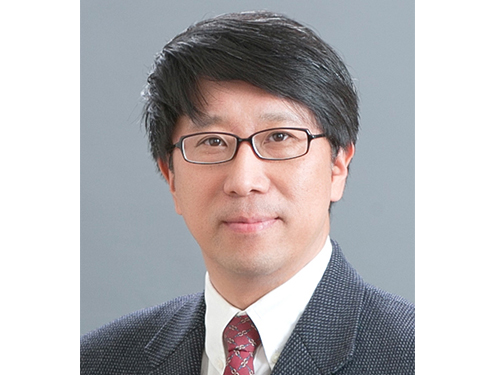 Professor Dongman Lee Wins the 2016 Korea Internet Award
Professor Dongman Lee of KAIST’s School of Computing received the 11th Korea Internet Award in the category of personal achievement on December 13 at the Creative Economy and Innovation Center in Gyeonggi province.
Hosted by the Ministry of Science, ICT and Future Planning of Korea, the Internet Award recognizes leaders in the Internet industry and their contributions.
Since 2010, Professor Lee has conducted research on the Internet of Things (IoT) platforms, resulting in the publication of five research papers in Science Citation Index (SCI) journals, ten papers in Korean journals, 30 best papers nominations at international conferences, and the registration of eleven patents. He has also worked on the creation of an IoT ecosystem through his research on object interworking platforms that can provide diverse user-customized services in the IoT environment.
His research team built a test bed for applicable IoT platforms on the 8th floor of the IT Convergence Center on campus to implement experiments and collect various data, thereby creating a foundation to carry out research projects in this field.
Professor Lee has helped the advancement of an Internet governance system in Korea by researching Internet governance policies, holding important posts in related academic societies including the Chairman of the Korea Internet Governance Alliance (KIGA) Council, and hosting major conferences such as the Asia Pacific Regional Internet Governance Forum (APrIGF).
2016.12.20 View 8658
Professor Dongman Lee Wins the 2016 Korea Internet Award
Professor Dongman Lee of KAIST’s School of Computing received the 11th Korea Internet Award in the category of personal achievement on December 13 at the Creative Economy and Innovation Center in Gyeonggi province.
Hosted by the Ministry of Science, ICT and Future Planning of Korea, the Internet Award recognizes leaders in the Internet industry and their contributions.
Since 2010, Professor Lee has conducted research on the Internet of Things (IoT) platforms, resulting in the publication of five research papers in Science Citation Index (SCI) journals, ten papers in Korean journals, 30 best papers nominations at international conferences, and the registration of eleven patents. He has also worked on the creation of an IoT ecosystem through his research on object interworking platforms that can provide diverse user-customized services in the IoT environment.
His research team built a test bed for applicable IoT platforms on the 8th floor of the IT Convergence Center on campus to implement experiments and collect various data, thereby creating a foundation to carry out research projects in this field.
Professor Lee has helped the advancement of an Internet governance system in Korea by researching Internet governance policies, holding important posts in related academic societies including the Chairman of the Korea Internet Governance Alliance (KIGA) Council, and hosting major conferences such as the Asia Pacific Regional Internet Governance Forum (APrIGF).
2016.12.20 View 8658 -
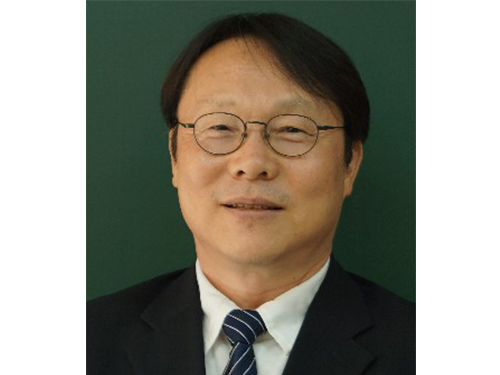 Professor Ih Reappointed as Vice President of the ICA
Professor Jeong-Guon Ih of the Mechanical Engineering Department at KAIST has been re-elected as the Vice President of the International Commission for Acoustics (ICA). His second term of office is from October 16, 2016 to September 30, 2019.
Professor Ih, the first Korean who was selected to a senior position on the ICA management board, took over his current post in 2015 when the vice president at the time passed away in the middle of his term.
During his stint, Professor Ih played a key role in planning the ICA’s triennial gathering, the International Congress on Acoustics, in Gyeongju, Korea, scheduled for October 24-28, 2022. He will also serve as the general chair for the conference.
The International Congress on Acoustics is the largest professional meeting in the field of acoustics. It provides a venue to meet, discuss, and exchange ideas covering all aspects of acoustics including an extensive technical exhibition that highlights the latest advances in acoustical products such as materials, systems, and equipment.
Acoustics has grown to become an important element in the Information Age in the areas of automation, machine learning, and virtual reality. Hosting the Congress will support Korea’s goal to lead acoustic research and development on the global stage.
Professor Ih said, “Serving international academic organizations offers great opportunities to learn global trends and to collaborate with various research institutions, universities, and industries worldwide. I hope my service will inspire many young Korean researchers to pursue their careers in this field.”
Professor Ih is also a member of eight eminent international academic societies such as the Audio Engineering Society, the International Congress on Ultrasonics, and the International Institute of Noise Control Engineering.
The ICA was founded in 1951 as a subcommittee of the International Union of Pure and Applied Physics (IUPAP), and it consists of 46 member states and four observer nations. It promotes international development and collaboration in all fields of acoustics including research, development, education, and standardization.
2016.12.16 View 7491
Professor Ih Reappointed as Vice President of the ICA
Professor Jeong-Guon Ih of the Mechanical Engineering Department at KAIST has been re-elected as the Vice President of the International Commission for Acoustics (ICA). His second term of office is from October 16, 2016 to September 30, 2019.
Professor Ih, the first Korean who was selected to a senior position on the ICA management board, took over his current post in 2015 when the vice president at the time passed away in the middle of his term.
During his stint, Professor Ih played a key role in planning the ICA’s triennial gathering, the International Congress on Acoustics, in Gyeongju, Korea, scheduled for October 24-28, 2022. He will also serve as the general chair for the conference.
The International Congress on Acoustics is the largest professional meeting in the field of acoustics. It provides a venue to meet, discuss, and exchange ideas covering all aspects of acoustics including an extensive technical exhibition that highlights the latest advances in acoustical products such as materials, systems, and equipment.
Acoustics has grown to become an important element in the Information Age in the areas of automation, machine learning, and virtual reality. Hosting the Congress will support Korea’s goal to lead acoustic research and development on the global stage.
Professor Ih said, “Serving international academic organizations offers great opportunities to learn global trends and to collaborate with various research institutions, universities, and industries worldwide. I hope my service will inspire many young Korean researchers to pursue their careers in this field.”
Professor Ih is also a member of eight eminent international academic societies such as the Audio Engineering Society, the International Congress on Ultrasonics, and the International Institute of Noise Control Engineering.
The ICA was founded in 1951 as a subcommittee of the International Union of Pure and Applied Physics (IUPAP), and it consists of 46 member states and four observer nations. It promotes international development and collaboration in all fields of acoustics including research, development, education, and standardization.
2016.12.16 View 7491 -
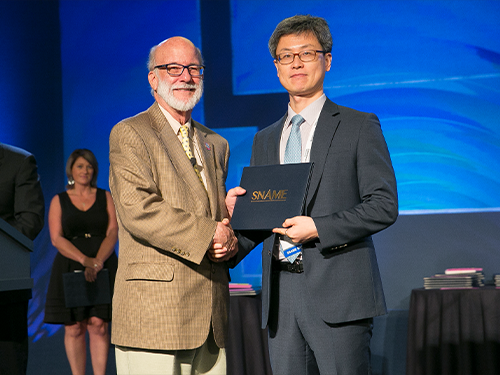 Professor Hyun Chung Claims the Elmer L. Hann Award 2016
Professor Hyun Chung of KAIST’s Mechanical Engineering Department received the Elmer L. Hann Award 2016 at the SNAME Maritime Convention (SMC) that took place November 1-5 in Seattle, Washington, in the United States.
Held annually, the SMC is the largest academic gathering for researchers and professionals in maritime and ocean engineering, and it is hosted by the Society of Naval Architects and Marine Engineers (SNAME).
With more than 6,000 members around the world in 85 countries, SNAME is an internationally-recognized, non-profit, professional society of individual members serving the maritime and offshore industries and their suppliers. It strives to advance the art, science, and practice of naval architecture, marine engineering, ocean engineering, and other marine-related professions through the exchange of knowledge and ideas, as well as the promotion of R&D, and education.
Every year, SNAME selects three research papers that are either published in its academic journal or presented at its sponsored conferences and awards them, respectively. One of the three awards is the Elmer L. Hann Award.
This year, the Society announced Professor Chung’s paper as the Elmer L. Hann Award winner. His paper, entitled “Tolerance Analysis and Diagnosis Model of Compliant Block Assembly Considering Welding Deformation,” was presented at the World Maritime Technology Conference held November 3-7, 2015 in Providence, Rhode Island, USA.
Analysis, management, and diagnostics of tolerance are important factors in the production of ocean structures. In the paper, Professor Chung’s team proposed a simplified tolerance analysis and diagnosis model including the effects of welding distortion for accuracy control in ship block assembly, thereby improving the production process.
Professor Chung said, “This is indeed a wonderful award for our team. From early this year, with support from the U.S. Office of Naval Research, we have collaborated with the University of Michigan, the Massachusetts Institute of Technology, Ohio State University, and the Edison Welding Institute to study this topic more deeply. We will keep up the good work to make meaningful progress.”
2016.12.10 View 8546
Professor Hyun Chung Claims the Elmer L. Hann Award 2016
Professor Hyun Chung of KAIST’s Mechanical Engineering Department received the Elmer L. Hann Award 2016 at the SNAME Maritime Convention (SMC) that took place November 1-5 in Seattle, Washington, in the United States.
Held annually, the SMC is the largest academic gathering for researchers and professionals in maritime and ocean engineering, and it is hosted by the Society of Naval Architects and Marine Engineers (SNAME).
With more than 6,000 members around the world in 85 countries, SNAME is an internationally-recognized, non-profit, professional society of individual members serving the maritime and offshore industries and their suppliers. It strives to advance the art, science, and practice of naval architecture, marine engineering, ocean engineering, and other marine-related professions through the exchange of knowledge and ideas, as well as the promotion of R&D, and education.
Every year, SNAME selects three research papers that are either published in its academic journal or presented at its sponsored conferences and awards them, respectively. One of the three awards is the Elmer L. Hann Award.
This year, the Society announced Professor Chung’s paper as the Elmer L. Hann Award winner. His paper, entitled “Tolerance Analysis and Diagnosis Model of Compliant Block Assembly Considering Welding Deformation,” was presented at the World Maritime Technology Conference held November 3-7, 2015 in Providence, Rhode Island, USA.
Analysis, management, and diagnostics of tolerance are important factors in the production of ocean structures. In the paper, Professor Chung’s team proposed a simplified tolerance analysis and diagnosis model including the effects of welding distortion for accuracy control in ship block assembly, thereby improving the production process.
Professor Chung said, “This is indeed a wonderful award for our team. From early this year, with support from the U.S. Office of Naval Research, we have collaborated with the University of Michigan, the Massachusetts Institute of Technology, Ohio State University, and the Edison Welding Institute to study this topic more deeply. We will keep up the good work to make meaningful progress.”
2016.12.10 View 8546 -
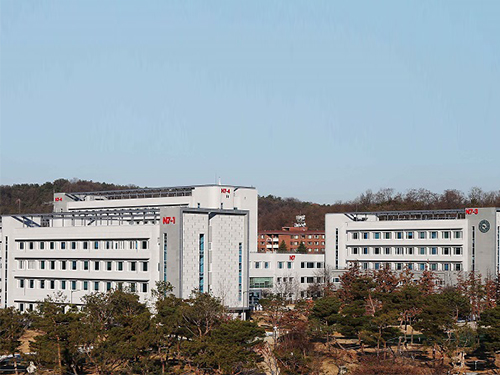 Mechanical Engineering Building on Campus Refurbished
KAIST’s Mechanical Engineering Department has finished the project to remodel its buildings and hosted an opening ceremony on December 12, 2016, which was attended by the university’s senior management and guests including President Steve Kang and Choong-Hwan Ahn, Architecture Policy Officer at the Ministry of Land, Infrastructure and Transport of Korea (MLIT).
With an investment of approximately USD 10 million, the old buildings (each consisting of seven floors and one basement) were transformed into smart, green buildings. Among the upgrades were the establishment of LED lighting systems, the replacement of the exterior walls with insulated materials, and the installation of double-glazed windows, all resulting in the improvement of the buildings’ energy efficiency. Previously, offices and lecture halls in the buildings had individual cooling and heating systems, which consumed a great deal of energy, but they were replaced with a centralized smart energy control system that monitors the operation status as well as energy consumption in real time.
With these new improvements, the Department was able to slash its energy consumption by 32%, for which it received Green Building Conversion Certification from MLIT. The ministry issues the certification to buildings that reduce their energy consumption by over 20% as a result of infrastructure upgrades. Beginning with the Mechanical Engineering buildings, KAIST will work on obtaining this certification for all of its buildings that are either under renovation or construction.
President Kang said, “We are pleased to offer our students a comfortable environment for study and research and will continue improving outdated facilities and infrastructure to make the campus safer and nicer.”
Picture 1: Ribbon-cutting ceremony for the refurbished Mechanical Engineering buildings on campus
Picture 2: Mechanical engineering buildings
2016.12.09 View 7486
Mechanical Engineering Building on Campus Refurbished
KAIST’s Mechanical Engineering Department has finished the project to remodel its buildings and hosted an opening ceremony on December 12, 2016, which was attended by the university’s senior management and guests including President Steve Kang and Choong-Hwan Ahn, Architecture Policy Officer at the Ministry of Land, Infrastructure and Transport of Korea (MLIT).
With an investment of approximately USD 10 million, the old buildings (each consisting of seven floors and one basement) were transformed into smart, green buildings. Among the upgrades were the establishment of LED lighting systems, the replacement of the exterior walls with insulated materials, and the installation of double-glazed windows, all resulting in the improvement of the buildings’ energy efficiency. Previously, offices and lecture halls in the buildings had individual cooling and heating systems, which consumed a great deal of energy, but they were replaced with a centralized smart energy control system that monitors the operation status as well as energy consumption in real time.
With these new improvements, the Department was able to slash its energy consumption by 32%, for which it received Green Building Conversion Certification from MLIT. The ministry issues the certification to buildings that reduce their energy consumption by over 20% as a result of infrastructure upgrades. Beginning with the Mechanical Engineering buildings, KAIST will work on obtaining this certification for all of its buildings that are either under renovation or construction.
President Kang said, “We are pleased to offer our students a comfortable environment for study and research and will continue improving outdated facilities and infrastructure to make the campus safer and nicer.”
Picture 1: Ribbon-cutting ceremony for the refurbished Mechanical Engineering buildings on campus
Picture 2: Mechanical engineering buildings
2016.12.09 View 7486 -
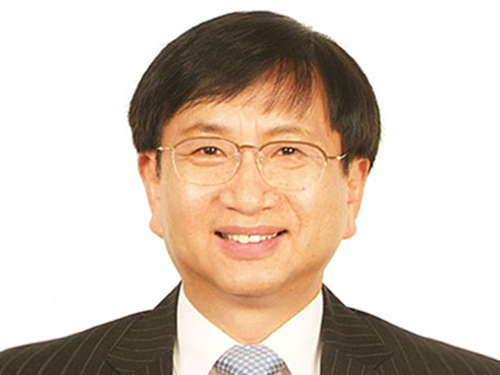 Professor Kwon to Represent the Asia-Pacific Region of the IEEE RAS
Professor Dong-Soon Kwon of the Mechanical Engineering Department at KAIST has been reappointed to the Administrative Committee of the Institute of Electrical and Electronics Engineers (IEEE) Robotics and Automation Society (IEEE RAS). Beginning January 1, 2017, he will serve his second three-year term, which will end in 2019. In 2014, he was the first Korean appointed to the committee, representing the Asia-Pacific community of the IEEE Society.
Professor Kwon said, “I feel thankful but, at the same time, it is a great responsibility to serve the Asian research community within the Society. I hope I can contribute to the development of robotics engineering in the region and in Korea as well.”
Consisted of 18 elected members, the administrative committee manages the major activities of IEEE RAS including hosting its annual flagship meeting, the International Conference on Robotics and Automation.
The IEEE RAS fosters the advancement in the theory and practice of robotics and automation engineering and facilitates the exchange of scientific and technological knowledge that supports the maintenance of high professional standards among its members.
2016.12.06 View 10181
Professor Kwon to Represent the Asia-Pacific Region of the IEEE RAS
Professor Dong-Soon Kwon of the Mechanical Engineering Department at KAIST has been reappointed to the Administrative Committee of the Institute of Electrical and Electronics Engineers (IEEE) Robotics and Automation Society (IEEE RAS). Beginning January 1, 2017, he will serve his second three-year term, which will end in 2019. In 2014, he was the first Korean appointed to the committee, representing the Asia-Pacific community of the IEEE Society.
Professor Kwon said, “I feel thankful but, at the same time, it is a great responsibility to serve the Asian research community within the Society. I hope I can contribute to the development of robotics engineering in the region and in Korea as well.”
Consisted of 18 elected members, the administrative committee manages the major activities of IEEE RAS including hosting its annual flagship meeting, the International Conference on Robotics and Automation.
The IEEE RAS fosters the advancement in the theory and practice of robotics and automation engineering and facilitates the exchange of scientific and technological knowledge that supports the maintenance of high professional standards among its members.
2016.12.06 View 10181